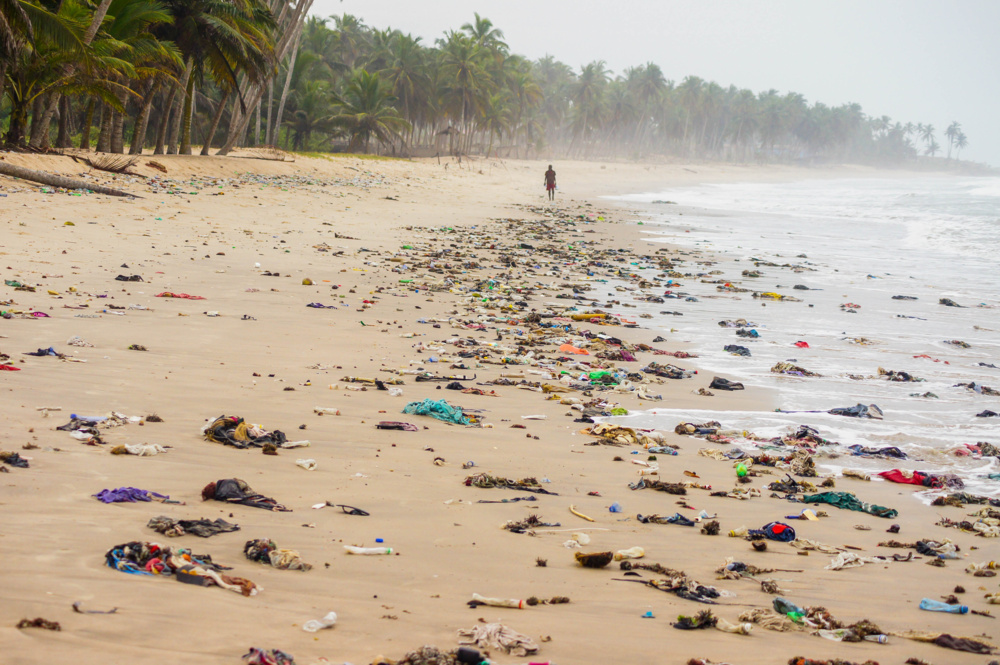
Our health and our planet need urgent progress at this week’s Global Plastics Treaty talks, says Environmental Justice Foundation
Today, the fifth and final session of the Intergovernmental Negotiating Committee to develop a legally-binding and universal agreement on issues of plastic pollution (INC-5) began in Busan, South Korea. Plastics are now in every part of the ocean, at the highest mountain peaks; plastic now pollutes children before they’re born and accumulates in our bodies. A global, comprehensive agreement is urgently needed, says the Environmental Justice Foundation (EJF).
Research shows that plastic pollution is a human health crisis. Plastics are present in and increasingly polluting our bodies. They have been found in our brains, blood, tissue, adult and baby faeces, human breast milk, and have even crossed the placental barrier to enter foetuses’ bloodstreams. The food we eat, the bottles and utensils we use to eat this food, the air we breathe – it all contains plastic particles that make their way into our system. We breathe in, eat, and drink on average 74,000 to 121,000 microplastic particles per year. People who primarily use plastic bottles for their water intake likely ingest 90,000 additional particles annually.
Plastics have infiltrated every part of the human lifecycle, with serious implications for our health. While we don’t yet know the full effects of these plastics in our bodies, scientists have raised concerns. Experiments show that plastics can cause metabolic and developmental issues, inflammation, chronic illness, and cancer, and stress the body’s immune system. Microplastics and the chemicals they contain can creep into our organs themselves. Children being exposed to these risks before they are even born is far too steep a price to pay for the throwaway convenience of the global trade in plastics, says EJF.
For adults, one study has found that people with microplastics in the linings of their arteries are at a higher risk of heart attack, stroke, or death from any cause. Other research has found that cancer cells spread at an accelerated rate after exposure to microplastics.
Our global addiction to plastics also has widespread environmental impacts, says EJF, as every piece of plastic ever produced still exists in our environment. This also harms the livelihoods of coastal communities who rely on healthy fisheries for their livelihoods and food, says the NGO. In 2019, plastics generated 1.8 billion tonnes of greenhouse gas (GHG) emissions, which is 3.4% of global emissions. While petrochemical and fossil fuel companies face a gradual green energy transition, they are looking to invest in single-use plastics, meaning this number is only expected to rise without significant action, says EJF.
EJF says that instead of treating the plastics crisis as simply a waste problem, we must address the entire life cycle of plastics. According to the NGO, this requires delegates to agree to the reduction of plastic production, a transition away from single-use systems, setting up reuse, refill, and repair systems, controlling the use of chemicals in plastic production, and securing strong financial mechanisms and a just transition for the implementation of the treaty. To make this happen, says the NGO, the voices of marginalised groups who are most impacted by the plastics crisis, and representatives from NGOs and civil society must be heard, rather than being overshadowed by petrochemical lobbyists.
Steve Trent, EJF CEO and Founder says, “Plastic pollution is one of the most pressing issues of our time. Every inch of our planet is polluted with plastics – from the peak of Mount Everest to the depths of the Mariana Trench. The stakes are as astronomically high as the mountain of plastic waste we throw in landfills, as emissions from plastics are also helping to drive the ever-worsening climate crisis.”
“The plastic already in our bodies is not going away anytime soon. Every piece of plastic ever produced still exists in our environment and bodies, thanks to the centuries-long process of biodegradation. The more we produce, the more plastics will pile up in our blood, bodies and babies. The only way we can protect future generations and ourselves from accumulating even more plastic is to swiftly start to reduce, and eventually end, plastic production.”
“At INC-5, the world’s leaders have a chance to address this. But to succeed, they must move beyond recycling and cleanup efforts, prioritising the health of people over the profits of petrochemical giants. This is a pivotal moment for global action. A strong treaty will clean up our planet and protect future generations from a legacy of plastic in their bodies. INC-5 delegates must make the right choice for humanity this week.”
ENDS
Notes to editors
While INC-5 is expected to be the last discussion, the current draft is far from complete, and previous negotiations in April this year raised numerous concerns, says EJF. Not only did petrochemical lobbyists attend and exert their influence in abundance, but the draft text was full of brackets and weak language.
During the negotiations, EJF, DietPlastik Indonesia, and Greenpeace Philippines will display their photography exhibition “Choose Reuse”, which showcases EJF’s Bottle Free Seas project alongside the organisation’s other reuse projects, at BEXCO, Exhibition Center 2, Hall 5A (3rd Floor) from November 25-29, and EJF will be in attendance throughout.
EJF works internationally to inform policy and drive systemic, durable reforms to protect our environment and defend human rights. We investigate and expose abuses and support environmental defenders, Indigenous peoples, communities, and independent journalists on the frontlines of environmental injustice. Our campaigns aim to secure peaceful, equitable, and sustainable futures.
Our investigators, researchers, filmmakers, and campaigners work with grassroots partners and environmental defenders across the globe. Our work to secure environmental justice aims to protect our global climate, ocean, forests, wetlands, wildlife and defend the fundamental human right to a secure natural environment, recognising that all other rights are contingent on this.
For more information, please email media@ejfoundation.org.
SIGN UP FOR OUR EMAILS AND STAY UP TO DATE WITH EJF